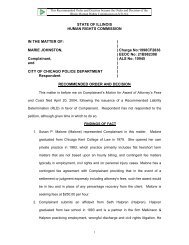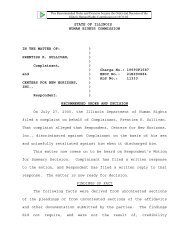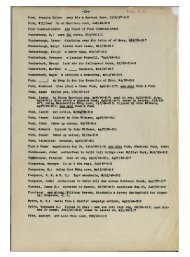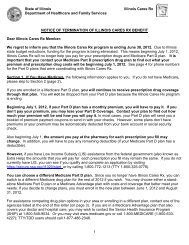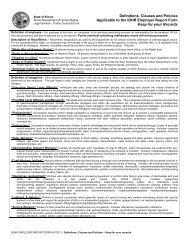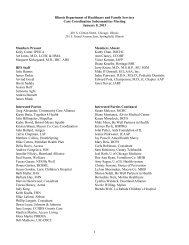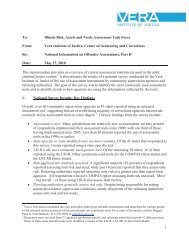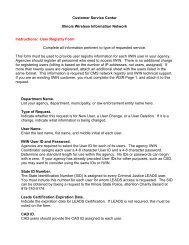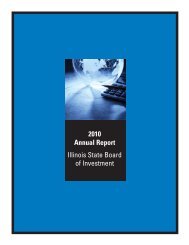Note 2 (continued)Deposits, Investments, and Investment RiskSecurities LendingISBI participates in a securities lending program with <strong>State</strong>Street who acts as a securities lending agent. Securities areloaned to brokers and, in return, ISBI has rights to a portion <strong>of</strong>a collateral pool. All <strong>of</strong> the securities are eligible for thesecurities lending program. Collateral consists solely <strong>of</strong> cash,letters <strong>of</strong> credit, commercial paper, and government securitieshaving a fair value equal to or exceeding 102% <strong>of</strong> the value <strong>of</strong>the loaned securities (105% for non-U.S. securities). In theevent <strong>of</strong> borrower default, <strong>State</strong> Street provides ISBI withcounterparty default indemnification. ISBI had no credit riskas a result <strong>of</strong> its securities lending program as the collateralreceived exceeded the fair value <strong>of</strong> the securities loaned. As<strong>of</strong> June 30, <strong>2009</strong> and 2008, there were outstanding loanedinvestment securities having fair values <strong>of</strong> $1,476,903,266 and$1,851,952,625, respectively; against which collateral wasreceived with a fair value <strong>of</strong> $1,528,744,414 and $1,912,742,552,respectively. Collateral received at June 30, <strong>2009</strong> and 2008consisted <strong>of</strong> $1,467,250,961 and $1,703,959,890 respectively, incash and $61,493,453 and $208,782,662, respectively, insecurities for which the Board does not have the ability topledge or sell.The cash collateral received is invested in a short terminvestment pool having a fair value <strong>of</strong> $1,395,768,803 and$1,703,959,890 as <strong>of</strong> June 30, <strong>2009</strong> and 2008, respectively. Thisinvestment pool had an average duration <strong>of</strong> 42.64 days and41.84 days as <strong>of</strong> June 30, <strong>2009</strong> and 2008, respectively. Anydecrease in the fair value <strong>of</strong> invested cash collateral isrecorded as unrealized losses and reported as a component <strong>of</strong>the investment income (loss) on the <strong>State</strong>ment <strong>of</strong> Changes inNet Assets. Regarding the investment pool, at the time <strong>of</strong>purchase, all securities with maturities <strong>of</strong> 13 months or lessmust qualify as first-tier securities and all securities withmaturities in excess <strong>of</strong> 13 months will (a) be rate A or better byat least two nationally recognized statistical ratingorganization (NRSROs) or (b) if rated by only one NRSRO, berated A or better by such NRSRO, or (c) if unrated, bedetermined by <strong>State</strong> Street to be <strong>of</strong> comparable quality.Derivative SecuritiesSome <strong>of</strong> ISBI’s managers invest in derivative securities. Aderivative security is an investment whose pay<strong>of</strong>f dependsupon the value <strong>of</strong> other assets such as bond and stock prices,a market index, or commodity prices. ISBI’s investments inderivatives are not leveraged. Obligations to purchase (long afinancial future or a call option) are held in cash or cashequivalents. In the case <strong>of</strong> obligations to sell (short a financialfuture or a put option), the reference security is held in theportfolio. Derivatives transactions involve, to varying degrees,credit risk and market risk. Credit risk is the possibility that aloss may occur because a party to a transaction fails toperform according to terms. Market risk is the possibility thata change in interest or currency rates will cause the value <strong>of</strong> afinancial instrument to decrease or become more costly tosettle. The market risk associated with derivatives, the prices<strong>of</strong> which are constantly fluctuating, is regulated by imposingstrict limits as to the types, amounts, and degree <strong>of</strong> risk thatinvestment managers may undertake. The Board and seniormanagement approve these limits, and the risk positions <strong>of</strong> theinvestment managers are reviewed on a regular basis tomonitor compliance with the limits.During the year, derivative investments included forwardforeign currency contracts, collateralized mortgageobligations (CMO’s), futures, and options.Forward foreign currency contracts are used to hedge againstthe currency risk in ISBI’s foreign stock and fixed incomeportfolios. Forward foreign currency contracts areagreements to buy or sell specific amounts <strong>of</strong> a foreigncurrency at a specified delivery or maturity date for an agreedupon price. As the fair value <strong>of</strong> the forward contracts varies,ISBI records an unrealized gain or loss. Forward foreigncurrency contracts represent an <strong>of</strong>f-balance sheet obligation,as there are no balance sheet assets or liabilities associatedwith those contracts. The fair value <strong>of</strong> forward foreigncurrency contracts outstanding at June 30, <strong>2009</strong> and 2008 wasas follows:Cost Fair Value Gain (Loss)$ $ $June 30, <strong>2009</strong>Forward currencypurchases 173,126,960 181,554,864 8,427,904Forward currency sales 183,451,357 197,473,806 (14,022,449)Total gain (loss) (5,594,545)June 30, 2008Forward currencypurchases 6,018,928 6,025,470 6,542Forward currency sales 5,890,350 5,969,514 (79,164)Total gain (loss) (72,622)ILLINOIS STATE BOARD OF INVESTMENT21
NOTES TO FINANCIAL STATEMENTSJUNE 30, <strong>2009</strong> (CONTINUED)Note 2 (continued)Deposits, Investments, and Investment RiskISBI also invests in mortgage-backed securities to maximizeyields and to hedge against a rise in interest rates. Thesesecurities are based on cash flows from principal and interestpayments on underlying mortgages. The value, liquidity andrelated income <strong>of</strong> these securities are sensitive toprepayments by mortgagees, changes in economic conditions,including real estate values, delinquencies or defaults, or bothand may be adversely affected by shifts in the market’sperception <strong>of</strong> the issuer’s and insurers and changes in interestrates. As <strong>of</strong> June 30, <strong>2009</strong> and 2008, the fair value <strong>of</strong> ISBI CMOholdings totaled $23,611,438 and $165,456,226, respectively.ISBI investment managers utilize financial futures to replicatean underlying security they desire to hold (sell) in the portfolio.In certain instances, it may be beneficial to own a futurescontract rather than the underlying security. Financial futurecontracts are also used to improve the yield or adjust theduration <strong>of</strong> the portfolio. Financial futures contracts areagreements to buy or sell a specified amount at a specifieddelivery or maturity date for an agreed upon price. The fairvalues <strong>of</strong> the future contracts vary from the original contractprice, a gain or loss is recognized and paid to or received fromthe clearinghouse. Financial futures represent an <strong>of</strong>f-balancesheet obligation, as there are no balance sheet assets orliabilities associated with those contracts. The cash orsecurities to meet these obligations are held in the investmentportfolio.ISBI investment managers utilize options in an effort to addvalue to the portfolio (collect premiums) or protect (hedge) aposition in the portfolio. Options are agreements that give oneparty the right, but not the obligation, to buy or sell a specificamount <strong>of</strong> an asset for a specific price (called the strike price)on or before a specified expiration date. As the writer <strong>of</strong>financial options, ISBI receives a premium at the outset <strong>of</strong> theagreement and bears the risk <strong>of</strong> an unfavorable change in theprice <strong>of</strong> the instrument underlying the option. As thepurchaser, ISBI pays a premium at the outset <strong>of</strong> theagreement and the counterparty bears the risk <strong>of</strong> anunfavorable change in the price <strong>of</strong> the financial instrumentunderlying the option.The following table shows the foreign and domestic futuresand options positions held by ISBI as <strong>of</strong> June 30, <strong>2009</strong> and2008.<strong>2009</strong> 2008Number <strong>of</strong> Contract Number <strong>of</strong> ContractContracts Principal* Contracts Principal*$ $Equity futures purchased 1,626 74,430,150 1,892 122,985,600Fixed income futures purchased – – 3 599,694Fixed income futures sold – – 790 167,444,230Fixed income written put options – – 347 34,700,000Fixed income written call options – – 283 28,300,000* Contract principal amounts shown represent the market value <strong>of</strong> the underlying assets the contracts control.Contract principal is shown to present the volume <strong>of</strong> the transactions but does not reflect the extent to whichpositions may <strong>of</strong>fset one another. These amounts do not represent the much smaller amounts potentiallysubject to risk. Contract principal values also do not represent actual balance sheet values.Investment LiquidityISBI holds investments in hedge funds, real estate funds,private equity funds and infrastructure funds that areconsidered illiquid by the very nature <strong>of</strong> the investment.Market risk exists with respect to these investments as ISBImay not be able to exit from the investments during periods <strong>of</strong>significant market value declines.ILLINOIS STATE BOARD OF INVESTMENT22
- Page 1 and 2: 2009ANNUALREPORTILLINOISSTATEBOARDO
- Page 3 and 4: BOARD MEMBERSCHAIRMANRonald E. Powe
- Page 5 and 6: International Equity 17%U.S. Equity
- Page 7 and 8: % Investment Returns June 30201510T
- Page 9 and 10: FINANCIAL HIGHLIGHTSFISCAL YEARS EN
- Page 11 and 12: FINANCIALSTATEMENTS2009ILLINOIS STA
- Page 13 and 14: MANAGEMENT’S DISCUSSION AND ANALY
- Page 15 and 16: STATEMENT OF NET ASSETSJUNE 30, 200
- Page 18 and 19: Note 2Deposits, Investments, and In
- Page 20 and 21: Note 2 (continued)Deposits, Investm
- Page 24 and 25: Note 3 General StateMember Systems
- Page 26 and 27: Note 4PensionsPlan DescriptionAll o
- Page 28 and 29: SUPPLEMENTALFINANCIALINFORMATION200
- Page 30 and 31: Moody’s S&P Shares/Quality Qualit
- Page 32 and 33: Moody’s S&P Shares/Quality Qualit
- Page 34 and 35: Moody’s S&P Shares/Quality Qualit
- Page 36 and 37: Moody’s S&P Shares/Quality Qualit
- Page 38 and 39: Moody’s S&P Shares/Quality Qualit
- Page 40 and 41: Moody’s S&P Shares/Quality Qualit
- Page 42 and 43: Moody’s S&P Shares/Quality Qualit
- Page 44 and 45: Moody’s S&P Shares/Quality Qualit
- Page 46 and 47: Moody’s S&P Shares/Quality Qualit
- Page 48 and 49: Moody’s S&P Shares/Quality Qualit
- Page 51 and 52: PORTFOLIO OF INVESTMENTSJUNE 30, 20
- Page 53 and 54: PORTFOLIO OF INVESTMENTSJUNE 30, 20
- Page 55 and 56: PORTFOLIO OF INVESTMENTSJUNE 30, 20
- Page 57 and 58: PORTFOLIO OF INVESTMENTSJUNE 30, 20
- Page 59 and 60: PORTFOLIO OF INVESTMENTSJUNE 30, 20
- Page 61 and 62: PORTFOLIO OF INVESTMENTSJUNE 30, 20
- Page 63 and 64: PORTFOLIO OF INVESTMENTSJUNE 30, 20
- Page 65 and 66: PORTFOLIO OF INVESTMENTSJUNE 30, 20
- Page 67 and 68: PORTFOLIO OF INVESTMENTSJUNE 30, 20
- Page 69 and 70: PORTFOLIO OF INVESTMENTSJUNE 30, 20
- Page 71 and 72: PORTFOLIO OF INVESTMENTSJUNE 30, 20
- Page 73 and 74:
PORTFOLIO OF INVESTMENTSJUNE 30, 20
- Page 75 and 76:
PORTFOLIO OF INVESTMENTSJUNE 30, 20
- Page 77 and 78:
PORTFOLIO OF INVESTMENTSJUNE 30, 20
- Page 79 and 80:
PORTFOLIO OF INVESTMENTSJUNE 30, 20
- Page 81 and 82:
PORTFOLIO OF INVESTMENTSJUNE 30, 20
- Page 83 and 84:
PORTFOLIO OF INVESTMENTSJUNE 30, 20
- Page 85 and 86:
PORTFOLIO OF INVESTMENTSJUNE 30, 20
- Page 87 and 88:
PORTFOLIO OF INVESTMENTSJUNE 30, 20
- Page 89 and 90:
PORTFOLIO OF INVESTMENTSJUNE 30, 20
- Page 91 and 92:
PORTFOLIO OF INVESTMENTSJUNE 30, 20
- Page 93 and 94:
PORTFOLIO OF INVESTMENTSJUNE 30, 20
- Page 95 and 96:
PORTFOLIO OF INVESTMENTSJUNE 30, 20
- Page 97 and 98:
PORTFOLIO OF INVESTMENTSJUNE 30, 20
- Page 99 and 100:
PORTFOLIO DATAFISCAL YEARS ENDED JU
- Page 101 and 102:
INVESTMENT TRANSACTIONS WITH BROKER
- Page 103 and 104:
RESTRICTED INVESTMENTSPublic Act 95
- Page 105:
STAFF AND INVESTMENT MANAGERSEXECUT



